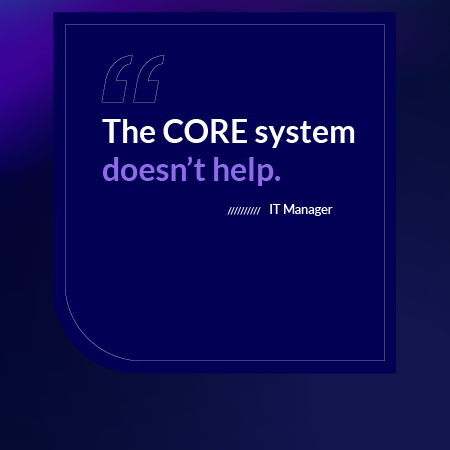
Low Code + Strategic Collaboration in IT Development Teams
July 29, 2025
Artificial intelligence and low code: the perfect combination for building applications
August 21, 2025The Importance of the Core System: Integration for IT and Business

"The CORE system doesn’t help." Have you heard this phrase before? When an IT leader says these words, they’re expressing deep frustration.

The core system, once the backbone of the company, has become a burden, a barrier, and a constant source of inefficiency—generating more backlogs than solutions. This means it’s outdated, inflexible, or simply not designed to meet the pace and demands of modern business.
Thinking of a full replacement may seem like the quickest answer. However, replacing a Core system is a monumental project—extremely costly, time-consuming, and full of risks. So, what’s the path forward when a total overhaul is not a viable option? One of the most commonly adopted solutions by large companies—with significant impact on both IT and business teams—is the use of Low Code platforms to integrate systems efficiently.
The impact of integration on IT and business teams
It’s important to highlight that integration is not just a technical concern—it’s a strategic capability that boosts the organization’s productivity and competitiveness.
For IT teams, the phrase “the Core system doesn't help” translates into daily headaches:
- Costly maintenance: They spend a disproportionate amount of time and resources maintaining an outdated system instead of innovating.
- Complexity and risk in changes: Any modification, no matter how small, can destabilize the entire system, causing fear of implementation and significant delays.
- Accumulation of technical debt: “Patch upon patch” solutions build up, making the system increasingly fragile and unmanageable.
- Team demotivation: Constantly working with outdated technology and manual processes can harm the ability to attract new talent.
How does efficient integration benefit IT?
Integration with Low Code platforms offers an agile solution.
- Reduction of technical debt: It allows the development of new functionalities on top of the Core without modifying its internal code or migrating to new languages. This reduces the risk of breaking something and frees the IT team from dealing with complex legacy code.
- Development agility: With Low Code, IT can build new applications in a fraction of the time compared to traditional methods. This speeds up response to business needs and reduces backlogs.
- Resource optimization: By automating processes and modernizing interfaces through integration, IT teams can reassign personnel from maintenance tasks to higher-value projects.
- Greater control and visibility: An integrated architecture provides a clearer view of data flows and processes, making it easier to proactively identify and solve problems.
-
For business teams, a limiting Core system translates directly into lost opportunities and daily friction.
- Slow time-to-market: The inability to launch new products or services quickly due to the rigidity of the Core system.
- Poor customer experience: Slow processes, lack of personalization, and difficulty interacting through modern channels.
- Lack of consolidated information: Difficulty obtaining a 360° view of the customer or market, preventing informed and strategic decision-making.
- Loss of competitiveness: Inability to meet current demands or match the capabilities of more agile competitors.
How does efficient integration benefit the business area?
Integration is the factor that streamlines a company's business processes.
- Accelerated Time-to-Market: Allows quick alignment of technological capabilities with business strategies. New features can be developed and integrated without waiting years for a full Core modernization, enabling faster product and service launches.
- Superior customer experience: Enables the creation of intuitive self-service portals, automated workflows for policy and claims management, and smooth omnichannel communication. By integrating data from various sources, unprecedented personalization becomes possible.
- Data-driven decision-making: By consolidating previously scattered information, the business gains a unified view of customers, operations, and markets. This enables deeper analysis and more informed strategy.
- Adaptability to change: The business can respond swiftly to market demands, regulatory changes, or new opportunities without being hindered by the rigidity of its core technology.
Coexist and thrive
At Deyel, we support leaders across Latin America in facing these challenges. We understand that coexisting with the Core system more productively is not only possible—it is often the smartest strategy.
Our Low Code platform enables organizations to develop new business features and processes and seamlessly integrate them with the company's current Core system. This means expanding the capabilities of the central system without modifying its internal code or upgrading to new languages, thereby avoiding the long, costly, and risky processes of a full replacement.

